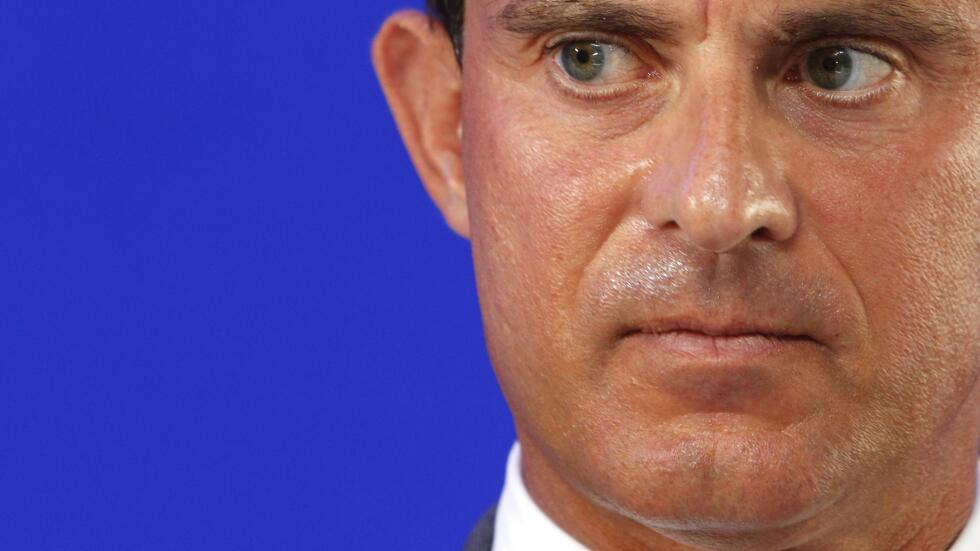Immigration, law and order divide France's Socialist government
France's high-profile Interior Minister, Manuel Valls, has caused a storm in the ruling majority with controversial statements on imValls of "creating disorder", President François Hollande has been obliged to rule out his suggestion of a debate on the rights of immigrants' families to come to France.
Issued on: Modified:

When ministers met at the beginning of the week for a seemingly anodine discussion on their hopes for France in 2025, Valls reportedly put the cat among the pigeons.
In the light of Africa's population growth, the left might have to revise its immigration policy, other participants reported him as saying.
The policy of automatically allowing immigrants to bring their spouses and children into the country might be open to question, he said, a statement he repeated in an interview with the BFMTV television channel.
And, some participants say, he questioned whether Islam is compatible with democracy, a touchy question throughout Europe but especially in a country where secularism is a key political watchword.
Earlier, as France slumbered through its annual summer news drought, he woke up the commentariat by suggesting that the Islamic veil might be banned in universities, as it already is in schools, and opposing Justice Minister Christine Taubira's plans to reduce the numbers in France's overcrowded prisons with lighter sentences.
Green ministers, whose rank and file are mostly to the left of the Socialists, hit back.
"On the question of justice there's only one line on the left,' said Housing Minister Cécile Duflot.
"The man who is supposed to incarnate order is provoking disorder," commented junior minister Pascal Canfin.
Off the record other ministers expressed concern about their publicity-hungry colleague and by Wednesday President François Hollande had declared that there was no debate on family reunification, apparently slapping down his ambitious interior minister.
Although right-wing leader Jean-François Copé agreed with Valls's analysis, only criticising him for not doing anything about it, author and researcher Patrick Weill agrees that the question is a "false debate".
Only 16,000 people benefited from family reunification in France last year, compared to 80,000 three decades ago, he told RFI on Wednesday.

"It goes down every year." he added. "It's no longer a problem ... and it's really regrettable that Monsieur Valls has brought it up again."
Valls has since said that his words at the ministerial get-together have been distorted, insisting that he said that it was up to France and Europe to prove that Islam "which we are asking to do things that others have done over centurues", is compatible with democracy and that he has toed the president's line while at the interior ministry.
But few believe that he regrets the publicity or that he dislikes his image as the government's tough guy on questions that are the favoured terrain of the right.
His timing wasn't bad, either.
French parties hold summer schools for their diminishing bands of activists as August draws to a close and the Greens started theirs on Wednesday - they have slipped in a solidarity appearance by Taubira this year - and the Socialist Party's starts this weekend.
There'll be more statements for the cameras there and Valls is likely to get plenty of coverage with his message that the party's name is out of date and that its secular republicanism should not fight shy of clamping down on crime and illegal immigration.
The interior minister was born in Barcelona and only acquired French nationality at the age of 20, a fact of which he reminded his predecessor, Claude Guéant, when he took over his job, reproaching the right for allegedly divisive policies.
His critics on the left say that he has continued many of he previous right-wing government's policies, for example with crackdowns on travellers' camps, although Hollande would seem to have picked him for the portfolio to fend off criticism that the Socialists are soft on crime and race.
Valls came last in the Socialists' primary election to pick their presidential candidate with six per cent of the votes but opinion polls show him to be the most popular minister in the government, ahead of the president and Prime Minister Jean-Marc Ayrault and with his closest rival being from the party's left, Industrial Recovery Minister Arnaud Montebourg.
That means that the press often cites him as a possible prime minister, if Hollande ever ditches Ayrault, although some of his allies say he is aiming for the presidency, a post that is unlikely to be available to him before 2022.
In the meantime, the Socialists and their allies have to ride out the effects of recession and their failure, so far, to set the economy back on its feet.
On the electoral plane they face local council elections in a a matter of months - in March next year, to be exact - and, for the moment, the left's prospects are not looking good.
Daily newsletterReceive essential international news every morning
Subscribe